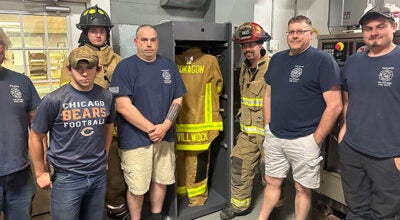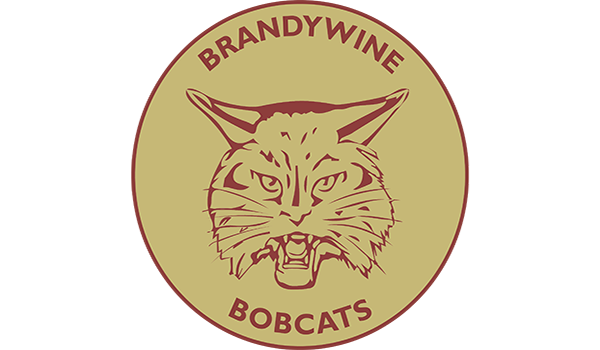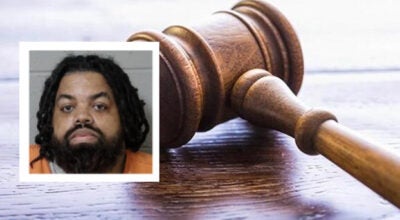Recovery stories
Published 7:01 am Tuesday, May 10, 2011
Essence grew up in Nevada with two younger brothers and a younger sister in a “nice family package” with camping and church youth group. “I can’t complain about my childhood and how I grew up.”
When she was 13, her mother decided to move to Michigan and “my siblings and I were split up, interrupting my family life,” she shared with Woodlands Behavioral Health Care Network’s May Mental Health Month breakfast Monday morning at Dowagiac Elks Lodge 889.
Public speaking frightens her, but Essence told an audience which included state Sen. John Proos, state Rep. Matt Lori, treatment court Judges Susan Dobrich and Stacey Rentfrow, County Commissioners Dale Lowe and Bob Wagel, Sheriff Joe Underwood and Undersheriff Rick Behnke that she began drinking and smoking marijuana at 13.
At 14, Essence met her biological father, who introduced her to methamphetamine.
“I was off and running,” said the 34-year-old former “party girl” who “had enough behind me to know I was not going to go anywhere. I was not going to graduate. I lived from motel to hotel and crashed at people’s places just to survive. I ended up going to my grandmother at one point and asking her to please buy me a ticket to send me out here to be with my mother. I was going to die if I stayed there.”
Essence did graduate from high school — on the honor roll — was a cheerleader and held down a part-time job.
“Yet my addiction was still there,” she said. By 21, she used cocaine “heavily. Without giving you a drug log, I’ve used many different kinds since I was 14.”
Essence became a mother at 23.
Her daughter supplied “pretty much the purpose of my life. I had no other purpose. My identity was the party girl and bartender. My addiction got in the way of me being a mother. I thought I was a good mother, doing the right thing,” she said tearfully. “I didn’t think I really had a problem because I’d never gotten caught. I coached a Little League team, I was out in the community. I thought I held it together, but it was a mess and I moved constantly.”
Last July she had her daughter in her vehicle when police pulled her over and found during their search a glass pipe in which she smoked meth.
Essence was placed under arrest, but not before trying to pass off a small purse with her drugs as her daughter’s.
“It’s horrible to have to say that today. Obviously, the officers knew otherwise. They’re not dumb. My daughter got to witness me be arrested and put in a cop car.”
With almost three months to sit in jail and think, Essence realized, “This is not what I pictured my life being growing up. Many times I did not want to live. I had no reason to live. I wasn’t a good mother anymore, so there was no purpose. I knew I had to do something different.”
Referred into Family Treatment Court, Essence was released from jail into Hope’s Door, a transitional home for women in Dowagiac. She felt like she was trading one jail for another, but it gave her a safe atmosphere.
Essence initially underestimated recovery because she was still in denial.
“My identity was party girl. If I changed that, who was I going to be? Change was really scary for me because I didn’t know who I was. It took me awhile and I got stuck thinking, ‘What do you want from me? I’m not drinking, I’m doing what they want me to do, so what’s the problem?’ Sitting at the same table, you can call each other out on their B.S. A group setting is very therapeutic. I finally realized recovery is not just staying clean. It’s a change life, of everything you do — the way you think and deal with emotions, the way you parent, I had to change everything to recover. It sounds difficult, but once you grasp that part of it, it isn’t that difficult. It’s amazing. I actually found myself through recovery. I started using at 13 before I knew who I was. Today, my life has purpose and meaning. I have my daughter back.”
Her daughter likes to remind her of things Essence would just as soon forget, but rather than argue with her, like before, “about once a week she looks at me and says, ‘I love you mom.’ Recovery has dramatically changed my daughter’s life and my family’s life. This is where I’m supposed to be and I’m very proud of myself today after where I came from.
“My friend Jen and I are starting an NA (Narcotics Anonymous) program in Cassopolis because there wasn’t one available. Kind of our way of giving back. Woodlands believed in me when I didn’t believe in myself.”
The audience gave her a standing ovation.
Recovery, at its heart, offers hope for a better life of meaning and purpose and hope for a sense of respect and dignity.
Recovery, often associated with addictions and substance abuse treatment, even in that realm means more than clean and sober and alcohol- and drug-free.
Recovery encompasses taking responsibility for your life and moving in a positive direction. Becoming involved in the community. Being a productive member of society. Reconnecting with neglected spirituality.
In that regard, wellness is a central theme. Wellness in all aspects of life — physical, mental, social, vocational.
Previously, treatment consisted of symptom management with medication and limited coping therapy for the diagnosis.
Adding recovery into the mix transcends symptom management. Moving beyond that negative diagnosis into a full, meaningful and purposeful life with a job and community involvement through volunteering keeps labels from defining you.
Jen, a mother of three, showed a photo of when she was addicted to meth and living an aimless existence in a “downward spiral.”
“My whole purpose in life was to get up in the morning, get the kids off to school, get high, go to work, get high, come home. The woman in this picture at one point didn’t eat or sleep. A month after this picture was taken, my life was flipped completely upside down. My home was raided for a meth lab. I went to jail. My children were removed and put into foster care. It was the worst day of my life. I begged and pleaded for my mother to get me out of jail. She said, ‘No, you need to sit there.’ I wasn’t happy with that.”
Jen pondered what to do while sitting in jail, but felt “lost. I was a mess, but that same person who went into jail was not the same person who came out. I also went to Hope’s Door and, like Essence, I thought I had replaced one jail with another. I kicked and screamed. Over the course of time, if it wasn’t for the resources Family Treatment Court offered, I wouldn’t be standing here today, clean for over a year.”
From June to November, Jen figures she attended “over 600 types of recovery meetings. I learned I can talk the talk, but it was actually walking the walk and making my insides match my outsides that was very, very difficult. But over time and a few stumbling blocks and a brick wall I smacked really hard, I was able to overcome that and move forward. I graduated Family Treatment Court about two weeks ago and my children are home. From losing everything last year to now, it’s so much different.
“Like Essence said, my children say, ‘You’re not the same mom as before.’ At least once a week they remind me of things I have done. Meth affects your frontal lobe, so we have a running joke when I don’t remember. Over time, that’s supposed to repair itself. There are some things I’m glad I don’t remember. I spend a lot more time with my family. Last weekend I saw 19 family members in two days, which is more than I had seen in five years.”
Jen added, “I’m very happy where I’m at today, moving forward, and I can’t wait to get this (NA) meeting in Cass going as part of my aftercare to keep me responsible.”






